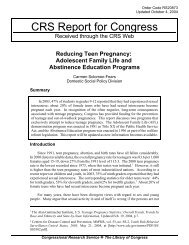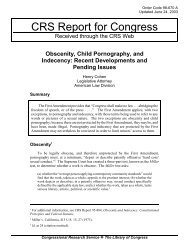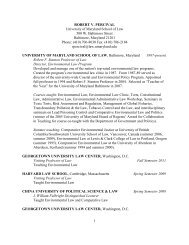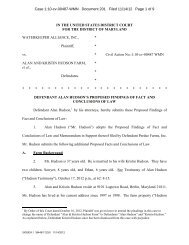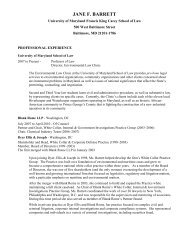University of Maryland School of Law : Catalog, 1988-1989
University of Maryland School of Law : Catalog, 1988-1989
University of Maryland School of Law : Catalog, 1988-1989
Create successful ePaper yourself
Turn your PDF publications into a flip-book with our unique Google optimized e-Paper software.
Course Requirements. First-year<br />
classes are generally scheduled<br />
Monday through Friday between<br />
the hours <strong>of</strong> 9:10 a.m. and 5:00<br />
p.m. Schedules are determined by<br />
the section assignment, which is<br />
made in early August. Assignment<br />
to sections is done at random.<br />
Only exceptional circumstances<br />
will permit a change in scheduling.<br />
Because <strong>of</strong> the schedule and the<br />
academic workload, students<br />
should not expect to be able to<br />
maintain employment during the<br />
first year.<br />
Evening students take all firstyear<br />
required courses (10 credits<br />
per semester) as described in<br />
Course Requirements. Classes for<br />
required evening courses are scheduled<br />
to meet Monday, Wednesday<br />
and Friday evenings between the<br />
hours <strong>of</strong> 6:25 p.m. and 10:15 p.m.<br />
Part-time day students take<br />
nine credits in the fall semester.<br />
These credits usually will include<br />
Civil Procedure I (3), Contracts<br />
I (2), Legal Method-Process (2)<br />
and Torts I (2); the spring semester<br />
schedule requirement is 10 credits,<br />
including Civil Procedure II (3),<br />
Contracts II (3), Legal Method-<br />
Process/Moot Court (1) and Torts<br />
II (3).<br />
Upper-Class Students' Schedules. To<br />
fulfill the residency requirement,<br />
day division students are required<br />
to carry not less than 11 hours nor<br />
more than 16 hours <strong>of</strong> course work<br />
during the third, fourth, fifth and<br />
sixth semesters; evening division<br />
students are required to carry not<br />
less than 8 nor more than 12 hours<br />
during the third, fourth, fifth,<br />
sixth, seventh and eighth semesters<br />
<strong>of</strong> residence,<br />
Students may not transfer from<br />
one division to another without<br />
permission <strong>of</strong> the dean. Students<br />
must take a majority <strong>of</strong> credits in<br />
the division, day or evening, for<br />
which they are registered. Courses<br />
<strong>of</strong>fered at 4:25, 5:05 or 5:25 p.m,<br />
or on Saturdays are considered<br />
both day and evening courses for<br />
purposes <strong>of</strong> this rule.<br />
Course Selection. Students are not<br />
permitted to delay taking required<br />
courses, such as Constitutional<br />
<strong>Law</strong>, Income Taxation and Evidence.<br />
Students are permitted to<br />
switch from one section <strong>of</strong> a course<br />
to another, if enrollment in the<br />
other section does not exceed the<br />
maximum permitted.<br />
Students assigned to different<br />
sections <strong>of</strong> a course may switch<br />
with one another, if both register<br />
for the course and plan to take it.<br />
Both students must submit the<br />
written request to Dean Forsyth.<br />
Any student beyond the first<br />
year who has been assigned to a<br />
section <strong>of</strong> a multi-sectioned <strong>of</strong>fering<br />
and who has previously been<br />
assigned to one or more courses<br />
taught by the same instructor for<br />
more than three credits (not<br />
counting the section at issue) will<br />
be assigned upon request to a different<br />
section.<br />
The rules on section-switching<br />
(a) apply to a transfer from one<br />
day or evening section to another,<br />
to a transfer from a day section to<br />
an evening section, and to a transfer<br />
from an evening section to a<br />
day section; but (b) do not apply<br />
to first-year courses or to the<br />
"limited enrollment" courses, such<br />
as Trial Practice and Counseling<br />
and Negotiation, where special<br />
registration procedures are followed.<br />
A student may not take for<br />
credit two courses in which a class<br />
session <strong>of</strong> one course is regularly<br />
scheduled to meet at the same<br />
time as a class session <strong>of</strong> the other<br />
course.<br />
For rules relating to multiple<br />
credit for a single piece <strong>of</strong> written<br />
work, see page 80.<br />
A student may not drop or add<br />
a course after the third week <strong>of</strong> a<br />
semester (or <strong>of</strong> the year, if a yearlong<br />
course), except by permission<br />
<strong>of</strong> the dean and, if a seminar, the<br />
instructor. At the time <strong>of</strong> advance<br />
registration, instructors may state<br />
exceptions to this general adddrop<br />
rule. A student may drop or<br />
add a clinical program at any time<br />
prior to the end <strong>of</strong> the first day <strong>of</strong><br />
classes for the semester in which<br />
the student commences the clinical<br />
program. During the remainder<br />
<strong>of</strong> the first week <strong>of</strong> the semester, a<br />
student may drop a clinical program<br />
only with the permission <strong>of</strong><br />
the instructor. A student may add<br />
a clinical program with the permission<br />
<strong>of</strong> the instructor at any time<br />
prior to the end <strong>of</strong> the second<br />
week <strong>of</strong> the semester.<br />
A course may be audited only<br />
with the permission <strong>of</strong> the instructor.<br />
67



